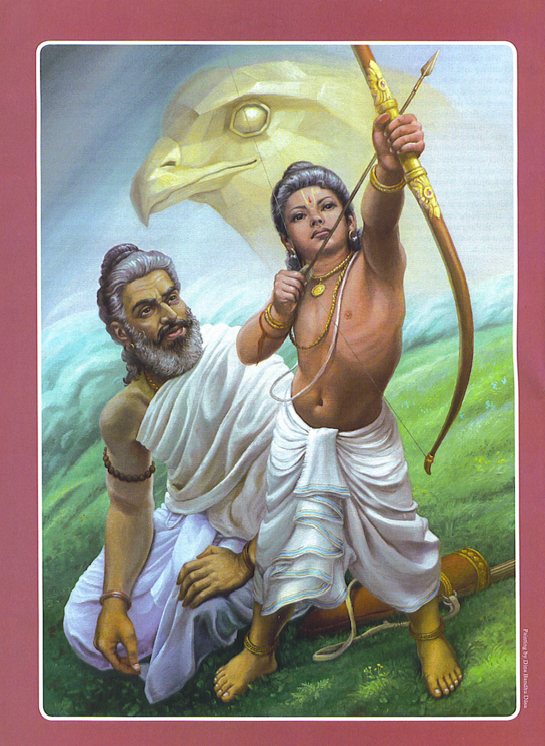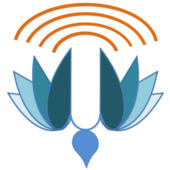Starting with text 6, 7 & 8 these verses are describing those who had come into the assembly from the whole of the universe. Particularly noted is the fact that the Pandavas along with Krishna had come. “Just to see the chief of the descendants of King Bharata [Bhisma], all the great souls in the universe, namely the rsis amongst the demigods, brahmanas and kings, all situated in the quality of goodness, were assembled there.” It doesn’t give a list of kings, although the battle was over and many kings were present, but the sages (rsis) those who were in the quality of goodness had come. Here is the list: “All the sages like Parvata Muni, Narada, Dhaumya, Vyasa the incarnation of God, Brhadasva, Bharadvaja and Parasurama and disciples, Vasistha, Indrapramada, Trita, Grtsamada, Asita, Kaksivan, Gautama, Atri, Kausika and Sudarsana were present.” Srila Prabhupada dedicates a number of pages to give some biographical information about these individuals. Srila Prabhupada’s audience was the world, particularly people from the western world who did not know who these personalities were. He gave snapshot biographical information for his general readers and for his students and disciples so that they will get something of a basic idea regarding the Puranic description of these personalities. His intention was for Srimad Bhagavatam and Bhagavad Gita to be our principal scriptures. While giving attention to Srimad Bhagavatam and Bhagavad Gita one will not have ready access to the vast Puranic information; so he selected out such information that were particularly useful for us.
First two on the list are Parvat Muni and Narada Muni. Parvata Muni and Narada Muni were both ‘devarsis’ or great sages giving wisdom to the demigods. Persons worship the demigods to get benedictions. These two were the persons who guided the demigods. They travelled together to many places as they were close friends. For example when Narada went the second time to visit Mrgari the hunter he was with Parvat Muni, who remarked, “How amazing! What transformation has taken place in this man who previously was a hunter. Now he doesn’t want to harm an ant.” Both Munis had the capacity to travel anywhere while singing the glories of the Lord. They were very powerful, extraordinary individuals. Narada is the direct son of Lord Brahma. Parvata Muni is mentioned in relation to the svayamvara ceremony of Draupadi. He was a Gandharva and could sing very nicely. Sometimes he visited the royal assembly of Kuvera.
Daumya was the family priest of the Pandavas. He regularly gave them advice in so many circumstances of life. He was proficient in rituals. He performed many samskaras and he also advised them how they could remain incognito for that one year in exile. Daumya was present for the funeral ceremony of those who were killed in the Kuruksetra battle. He was an intimate associate who could advise even the Pandavas. He was present for grandfather Bhisma’s passing.
Vyasadeva was present. He compiled the Vedas and dictated Mahabharat to Lord Ganesh who agreed on condition that Vyasa should not stop in the middle. Vyasa agreed and did not stop and spoke nonstop while Ganeshji wrote. Vyasa was the son of Parasara Muni and Satyavati. When the two sons of Santanu and Satyavati, named Citrangada and Vicitravirya died before they had produced sons, this created a major problem: a successor to throne was not there! Satyavati was very anxious about that, being the queen. Her husband had died shortly after the two sons were born and the two sons died shortly after they became king. At the time of Vicitravirya’s death both Ambika and Ambalika wanted to enter the funeral pyre of their husband. Satyavati made a strong argument that if at all they were dutiful in service to their husband, they would not do so. Rather, as a demonstration of their attachment to their husband, they should accept Satayavati’s proposal that as the queens of Vicitravirya they will produce sons who will be heirs to the throne. They didn’t like that idea at all. How can they cohabit with anyone other than their husband? Satyavati explained that it is part of Vedic culture. In circumstances like this – if the husband is unable to produce a son, the brother of the husband may produce a son with the son-less Queen. That particular practice is prohibited in the age of Kali, but in Dvapara Yuga this was a valid code of dharma, which Satyavati invoked. Very reluctantly they agreed. The only son of Satyavati that they knew off was Bhisma. So they didn’t enter into the funeral pyre of their husband Vicitravirya. However, when Satyavati approached Bhisma with this proposal, he gave her an emphatic “No!” She was arguing with him to examine what was at the stake. He replied “What is going to be the fruit of an act done for the sake of expediency, but not on the principle of virtue?” He reminded her about her other son Vyasa who can beget the heir to the throne. The benediction that Satyavati had received from Vyasa when he was born was that if she simply remembered him, he will at once come. She remembered him and he came at once. Mahabharat describes that when he came he was looking terrible because he was in the process of extended austerity. His body was emaciated, caked with mud and smelly, hair matted and frightening. Satyavati said, “I have some important service for you. You have to produce children that will become the next generation of kings.”
“Mother the time isn’t good right now. I am very unpresentable. If you can wait until I complete my austerities it will be much better.”
“No. no! I can’t do that. Because of the plan of the Lord, who can say what may happen. My husband, in untimely manner he is gone. My two sons are also gone in untimely manner. If I wait for some time, who can say whether you will be around or they will be around. It should happen right away.”
” Mother I don’t advise it, but you are my mother; if you insist, I must oblige you.”
Mahabharat describes that both Ambika and Ambalika were preparing to receive Bhisma in their personal chamber. However, instead of Bhisma, Vyasa came into their room! They were shocked. Ambika closed her eyes. When Vyasa left her chamber he told Satyavati that as Ambika had closed her eyes, the son who will be born will be highly virtuous and qualified but blind. Satyavati understood that he won’t be able to become the king. She called Vyasa again to produce a child with Ambalika. Ambalika heard from Ambika what the story was. When Ambalika saw Vyasa she paled; as a result the child produced, Pandu, the father of the Pandavas, was most qualified but weak in his physical constitution. Then Satyavati requested Vyasa one more time. Again he came to Ambika’s room. This time it wasn’t Ambika but her maid servant. She very respectfully received Vyasa as he deserved and Vidura was born as the son of sudrani. Dhrtarastra, Pandu and Vidura were born as sons of Vyasa. This was the biography of Vyasa who was the biological father of the Kaurava kings. Vyasa is most famous for the compiling of the Vedas and being the father of Sukadeva Gosvami. He personally came for the departure of grandfather Bhisma.
Brhadasva was an ancient sage who met Maharaj Yudhisthira now and then. The first time Brhadasva met Yudhisthira was at Kamyavan forest and he narrated the history of Maharaj Nala. Several very well-known rsis such as Bharadvaja rsi, Vasistha and Indrapramada, Atri muni were among the seven great sages who had come.
Bharadvaja was the father of Drona and how Drona was born is described here. Bharadvaja Muni was going to take his bath in the Ganges and happened to see a celestial maiden. He became attracted to her and discharged semen. The semen was caught in a pot and from that pot Drona was born. Hence Drona was understood to be the son of Bharadvaja Muni.
Parasurama or Renukasuta was also present. He trained Bhisma in military skill. He fought with Bhisma to force him to marry Amba but he was unable to defeat Bhisma. In the end he gave Bhisma the benediction that he would be the greatest fighter on the earth.
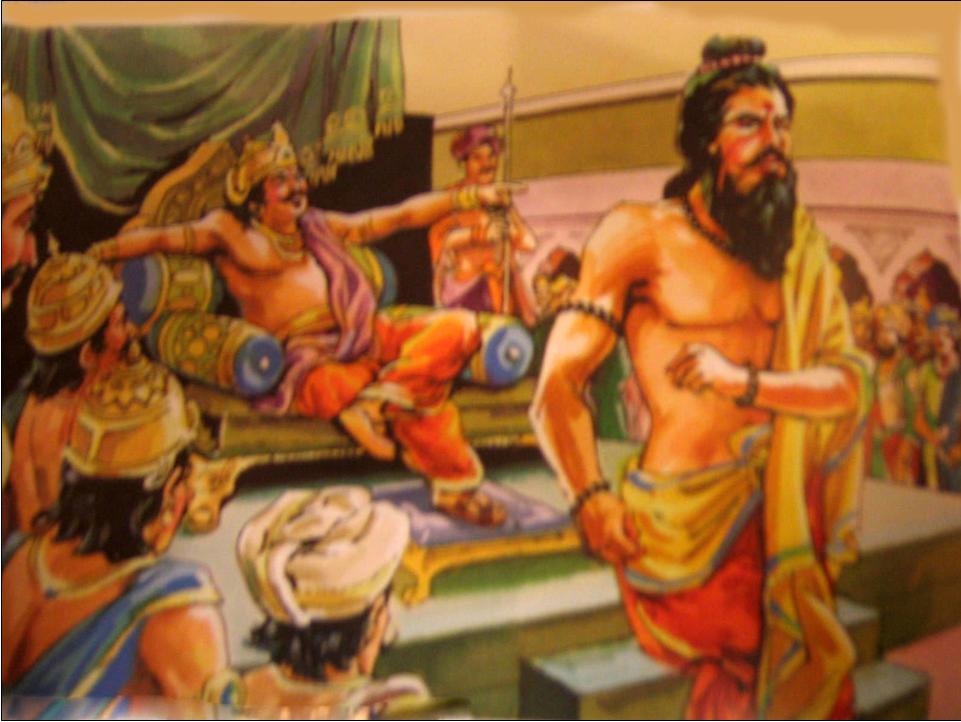
Drupada insulting Drona
Drona was the son of Bharadvaja muni. Parasuram had liberality with the Brahmanas. He thus gave all his weapons and gave the science of fighting to Drona which Drona later on used in very fruitful ways. Grandfather Bhisma consented for Drona to become the teacher of the royal family in military skill. In their youth Drona and Drupada went to school together. They grew up together as fast friends from childhood. Drupada told Drona “When I grow up and become the king I will take care of you. You will be the Brahmana in my kingdom and I will be the king and we will be the best of friends. When Drupada became king his disposition changed and he didn’t want to give honor and respect to his dear friend, Drona. In fact he insulted him. When Drona needed maintenance and went to Drupada he insulted him.
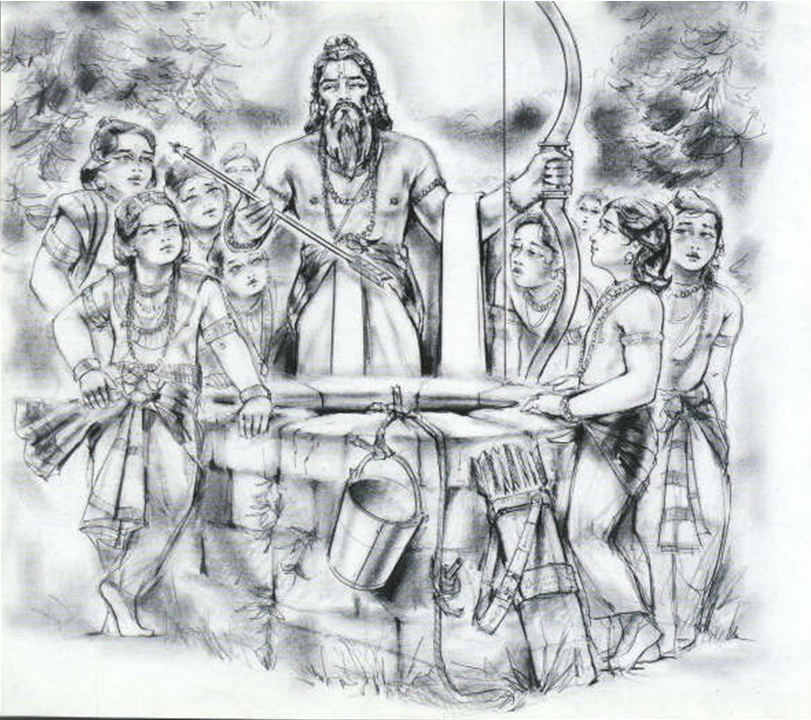
Drona impressing the young kuru princes
Drona decided that to protect the religious principles of my friend I will make an arrangement. He went visit his brother-in-law Krpacarya who was the twin brother of Drona’s wife Krpi. Krpacarya was one of the priests of the royal family. Once the boys were playing with a ball, which had fallen into a well. They couldn’t get the ball out of the well. Drona came along and he extended a series of straws, which pierced the ball, and in this way he got the ball out of the well. They were impressed with his intelligence and invited Krpacarya to come back home with them.
When Drona met Bhisma, he explained to him exactly what he wanted to do: He wanted to train the children of the royal family in military skills, passing on to them all that he had learned from Parasurama. After fully training the boys, when they grew up he would guru daksina from them. The daksina he wanted was that they will fight with Drupada, defeat him and take the kingdom from him. Then he will give him back half of the kingdom. This strategy was his get-back mentality which is not good. However, his plan was what happened. When the boys grew up and received their daksina request from Drona, first the Kauravas went to fight with Drupada. They were soundly defeated by Drupada. When it became the Pandavas turn to fight with him, Arjuna alone defeated Drupada and brought him to Drona, bound with ropes, as was the requested daksina. Drona thanked him and said to Drupada, “You are my friend. We grew up together. I now own your kingdom. Just as you said I will give you half the kingdom, and I will keep only half of the kingdom. You retain the other half.’ Drupada accepted half of the kingdom but he too had the get-back mentality. He arranged for a Yajna whereby he would have a son that would kill Drona. From that Yajna Dhrntadyumna and Draupadi were born. During the Kuruksetra battle, indeed Dhrntadyumna killed Drona.
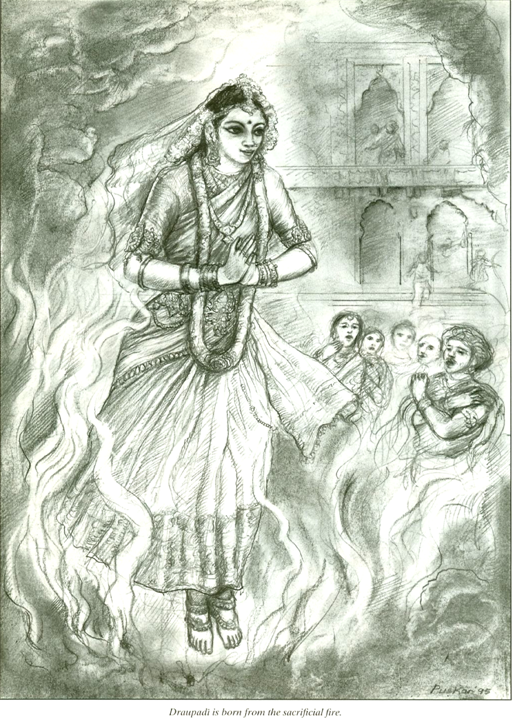
Draupadi is born from the sacrificial fire
Lord Parasuram was there, Bharadvaja muni was there. Seven great sages were there. Vasistha was there. The Vasus’ trying to steal Vasistha’s ‘Kamadhenu’ was the reason for the trouble which the eight Vasus got themselves into. Later sage Visvamitra also wanted the ‘Kamadhenu’.
Sage Grtsamada was there .Asita rsi was also there. Srila Prabhupada writes here “There was a king of the same name, but herein the Asita mentioned is the Asita Devala rsi, a great powerful sage of the time. He explained to his father 1,500,000 verses from the Mahabharata. He was one of the members in the snake sacrifice of Maharaja Janamejaya.” King Janamejaya wanted to kill all the snakes on earth because his father was killed by a snake. So he gathered all the sages to perform a hugh yajna which would kill all the snakes.
Also present were Kaksivan, Atri Muni (one of the seven great rsis), Kausika and Sudarsana — the Lord’s Sudarsana chakra personified! Srila Prabhupada comments that the Puranas describe that the Sudarsana chakra was a gift from Agnideva to Lord Vishnu. It was not as if Lord Vishna did not possess the Sudarsana chakra before that. It was just an arrangement or Lila. Prabhupada gives the example of Ksna receiving Rukmini as His wife. They are eternal associates! The gifting of Sudarsana by Agni as described in the Puranas was also similar to that. That is how it should be understood.
“And many others like Sukadeva Gosvami and other purified souls, Kasyapa and Angirasa and others, all accompanied by their respective disciples, arrived there.”
We know more about Sukadeva Gosvami than anybody else on the list. He was the son of Vyasa. He received the knowledge of Srimad Bhagavatam from Vyasa. He spoke Srimad Bhagavatam to Maharaj Pariksit.
“From Mahabharata, Sabha-parva (4.11), it is understood that he was also present in the royal assembly of Maharaja Yudhistira and at the fasting of Maharaja Pariksit. As a bona fide disciple of Sri Vyasadeva, he inquired from his father very extensively about religious principles and spiritual values, and his great father also satisfied him by teaching him the yoga system by which one can attain the spiritual kingdom, the difference between fruitive work and empiric knowledge, the ways and means of attaining spiritual realization, the four asramas, the sublime position of the Supreme Personality of Godhead, the process of seeing Him face to face, the bona fide candidate for receiving knowledge, the consideration of the five elements, the unique position of intelligence, the consciousness of the material nature and the living entity,” and so on. He was well equipped. In the Bhagavatam we only hear that he was instructed the synopsis of Srimad Bhagavatam by his father but elsewhere we can understand he was thoroughly instructed by Vyasa and specifically in the best of all literatures, Srmad Bhagavatam.
Kasyapa: One of the prajapatis, the son of Marici and one of the sons-in-law of Prajapati Daksa. Daksa produced one thousand sons and Narada converted them all into Brahmacharis. Then Daksa produced daughters. The daughters were given in marriage to different rsis and one of those rsis was Kasyapa. Kasyapa married thirteen of Daksa’s daughters. Their names are mentioned, with Aditi and Diti at the top of the list. From these marriages Kasyapa produced (this is in the 6th canto of S.B.) many of the varieties of species. This is the Vedic explanation or Bhagavatam’s explanation of how varieties of species came. It wasn’t Darwinian evolution– gradual successive changes of mutation over a long period of time. It was Kasyapa and wives. Sadaputa Prabhu has explained this phenomenon in a very interesting way, which he calls “human devolution”. The human devolution picture holds that Lord Brahma was endowed by his Creator, and in turn his direct sons the Prajapatis, were endowed with vast gene pools. For example, some of us have blue eyes, while some have brown eyes. The dominant gene is brown. If brown is there it will show. The gene pool of mother and father determines what is going to be the color of the eyes of the child. That is what modern science says, anyway. Vedic science, in turn, would argue that Brahma and the Prajapatis have a much bigger gene pool, so they can produce a vast array of offspring with diverse qualities. That is the facility invested in them as Prajapatis. They populate the planet for service to the Lord, being invested with this unique high qualification. Kasyapa had such a high qualification – both spiritual and material – so he served the Lord in this way. That is a Vedic explanation.
Angirasa (the last on the list) was the son of Maharsi Angira and is also known as Brhaspati, the chief priest of the demigods. The chief priest of the demigods came all the way from heavenly planets to observe the departure of grandfather Bhisma.
Bhismadev received everybody. When you receive people you get up, smile, seat them and make arrangements. However, Bhismadev’s body was riddled with arrows. Yet the verse says he perfectly satisfied all of his guests because he knew the art of vaishnava etiquette according to time, place and circumstance. In the circumstance he wasn’t able to get up and do anything; but by his manner of receiving with the soul, graciously, everyone was fully satisfied. It is not just what we do make people satisfied. We must understand this. When an unexpected guest comes to your home, one of the duties of the grhasta is to receive guests as if they were Narayana Himself. Grihastas need to know the art of receiving guests. There are basic things one must do. Srila Prabhupada taught us again and again. You invite them in, you offer them a place to sit (if you don’t have furniture at least a straw mat) and you give them some refreshment. If you don’t have anything to offer at least offer a glass of water. The third requirement is to offer some kind words. What you do and how you do it makes people really feel welcome. You all have the experience of going someplace and feeling uncomfortable, yet conversely going some other place and feeling very comfortable. Bhismadev made everybody feel completely contented. Personalities from outer space, kings etc. had come. He couldn’t move, but he spoke and emoted in such a way that they were perfectly satisfied. That is grandfather Bhisma’s grace. One can perform ones duty by physical work, by mind and by words. And Bhisma knew well how to utilize them in the proper place, and therefore there was no difficulty for him to receive them, although physically he was unfit. He wasn’t whining, groaning and moaning and they didn’t come to just feel sorry. He received them very very warmly, joyfully. They were fully satisfied.
“Lord Sri Krishna is situated in everyone’s heart, yet He manifests His transcendental form by His internal potency.” This very Lord was sitting before Bhismadeva and since Bhismadeva knew of His glories, he worshipped Him duly. He received the guests warmly, yet he worshipped Krishna. That is appropriate. We respect everyone, while we worship Krishna and Krishna’s devotees. During the Rajasuya Yajna particularly and in other places as well, Bhisma demonstrated that he knew Krishna’s position. In the previous chapter we discussed in Prayers of Queen Kunti that Kunti also understood Krishna’s position. She understood that Krishna was non-different from the Supreme Personality of Godhead, the original source of all creation and he was situated in the heart of all living beings. That is the first of Kunti’s prayers. Kunti knew it and Bhishmadeva knew it. Kunti was bewildered by it. Bhishmadeva was not bewildered by it. He was perfectly clear. Imagine if you had such an understanding that the Personality of Godhead, who is the Lord within the heart of every living being is standing right before you! He worshipped Him with utmost respect, according to time place and circumstance. Physically he could not do what he would have done if he were hale and hearty. Within his limitations he worshipped Krishna.
The sons of Maharaja Pandu were sitting silently nearby. Bhishmadeva congratulated them with feeling. There were tears of ecstasy in his eyes, for he was overwhelmed by love and affection for them. This is the sign of a great personality. There are many things to consider about his own situation, but he is not thinking about himself. A great personality thinks about welfare of others. That is a sign of great personality. Here is Bhisma whose body is shot through with arrows – who knows how many arrows, so many arrows that his body wasn’t even touching the ground but resting on the arrows! Arrows piercing both sides of his body, it was incredibly painful. He is in such pain, but he is thinking about the suffering of others. While he is thinking about the suffering of others, tears of ecstatic joy are coming to them thinking about how dear they are to Krishna.
In the purport Srila Prabhupada discusses, Bhisma knew very well, as Vidura also knew very well, all the intrigue, all the nasty, terrible stuff that Duryodhana and company were up to. He knew it perfectly well and he felt such protectiveness – just as Vidura also felt protectiveness — towards the Pandavas. Their father Pandu died due to a curse; in his youth he had shot an arrow at two deer. It turned out that they were a yogi and yogini and he had injured them. He was cursed that when he would be engaged in union with female he would die – so that happened. He died in that way. The Pandavas were with their father in forest. Madri entered the funeral pyre with her husband. Kunti with her five young boys came back to the royal palace, minus Pandu. They had no father. Bhisma who was a brahmachari acted like their father. He was their surrogate father. He knew the difficulty that they and Kunti had, dealing with different intense circumstances of life — unprotected. Bhismadeva remembered the great tribulations suffered by his most pious grandsons. Just seeing the Pandavas in the condition he was in, he was appreciating the difficulties and tribulations they had undergone.
We will see how Bhismadeva is advising the Pandavas — and thereby how the Bhagavatam is advising us – to address life’s tribulations. These are extremely valuable instructions, because we all experience tribulations in life. We don’t ask for them. They just come in the door, inside the home, take over and rule the place like they are in charge. How are you to deal with such a situation – tribulations of life? When Bhisma saw the Pandavas he knew how heavy their hearts were over the whole situation of the Kuruksetra battle, particularly Yudhisthira. Yudhisthira was feeling responsible for the killing of so many people. He thought that for him to become the king so many had died. The same argument that Arjuna was giving before the Kuruksetra battle, Yudhisthira was feeling after the battle. “So many wives are now without husbands, so many children are now without fathers, so many persons are now without protectors – so that I can become king.” So many persons tried to pacify Yudhisthira and no one could pacify him. Even Krishna could not pacify Yudhisthira — just so that Bhismadeva could pacify Yudhisthira. “Just see, he is greater than Me!” That is Krishna’s wish — that is Krishna.
When the Pandavas came back from the forest after the demise of their father, Bhisma accepted a role like their father. And they were very very powerful! They faced lot of tribulations — poison tribulation, arson tribulation, hiding after the arson tribulation, marriage of Draupadi svayamvara situation, then coming back with Draupadi as their queen and treated very badly. When the boys came back, the initial mood was very positive. “The Pandavas, sons of Pandu, have come!” Everyone respected them to be successor to the throne. Dhrtarastra himself treated them very kindly but the Pandavas were so good, so powerful and so amazing that it inspired envy in the hearts of the other boys especially Duryodhana. When the boys were playing games together Bhima would toss the other youth all over the place just playfully. Duryodhana could not stand it. He felt humiliated, due to immense pride in his heart. It finally got to a point where he started thinking of getting rid of Bhima. So he made proposal to his father. “I want to kill him. Please give your permission.” Dhrtarastra strenuously rejected it. “How is it possible?! My brother Pandu cared for me. I was blind and he cared for me as a dear friend. As we were growing up he cared for me so affectionately. How can I turn around now in his absence and kill one of his sons? Don’t make such a proposal.”
Duryodhana knew how to ply the weak heart of his father and kept needling and wheedling. “I can’t take it. If you want to lose me then deny me this privilege. If you want me to live, I will poison him.” The weak hearted Dhrtarastra fell silent. Duryodhana knew he had won. He got a conspirator in the plan. There was a large residential summer house where the royal family will go and conduct activities together sometimes. The young boys will have an outing. They will sport together, wrestle together, play water sports together and then feast. In the feast they gave in the plate of Bhima poison enough to kill ten men. He ate up everything. Then there was water sporting activity. He was throwing everybody like one who is unlimitedly powered. At the end of the day Bhima was feeling tired. He went to rest by the side of the river. While he was resting he was tied up very tightly in ropes and tossed in the river. They thought he was finished. The ropes were so tight that Bhima could not become free. The Naga princesses saw Bhima and drew him down, down into the world of Nagas. When the serpents bit Bhima the poison from the serpents neutralised the poison he had taken, so he lived. Bhima expanded his body and burst the ropes. They went to Vasuki to find out what to do. Vasuki with Arkha one of his chief ministers came disguised as humans. They could change from serpent form to human form. Arkha immediately recognized Bhima because two generations ago he was the grandfather of Kunti and he recognised Kunti’s son Bhima. “Bhima what are you doing here? This is Nagaloka.” Vasuki then explained (as the Nagas could understand beyond space) the plan of Duryodhana to poison and kill Bhima. Now you are rescued.” “Arkha how should we honour this very special guest?” Arkha said, “We can honor him by giving the special ‘Rasa ‘ which even if one drop is consumed will give the strength of one thousand elephants.” They didn’t know what capacity Bhima had for eating. He gulped down a complete pot of the ‘Rasa’, and then another, and then another! They had never seen anything like that before. After taking the ‘Rasa’, Bhima said, “I need some rest.”
He rested a long time. When he awoke he had the strength of ten thousand elephants and this strength stayed with him thereafter. They dressed him in their royal style and informed Bhima, “Your family members are getting anxious about your well-being. We are very happy to have you here but for their peace of mind it is best that you return. Beware of Duryodhana.”
Meanwhile back in Hastinapur. The Pandavas returned expecting maybe Bhima had gone ahead of them but Bhima didn’t show up. Kunti was in great anxiety. She went to Vidura and asked him what to do. Vidura very simply said Vyasa told us that your sons are invincible. Just by believing in the words of Vyasa, Kunti was pacified. “Wherever he is, he is under the protection of Vyasa and the Personality of Godhead.” Her anxiety was gone. Very instructive. Just the words of a saintly person Vyasadeva is sufficient to clear such an anxiety as a mother concerned for her missing son. Her son was missing in action. Just hearing the words of Vidura about the assurance of the words of Vyasa, Kunti’s anxiety was gone.
Sure enough Bhima came back. He got all the brothers together and disclosed the whole intrigue, the explanation of which he had learned from the Nagas. Bhima now with the strength of ten thousand elephants wanted to bash Duryodhana. Yudhisthira considered the situation and said,” It is not a good idea. We have been away from the palace for a long time. We have only recently come back. When there is conflict like this there are so many allies of the sons of Dhrtarastra. It is not advisable to make a stand right now. Let us be very very careful knowing the mentality of Duryodhana, what he is capable off. Just be very watchful. Don’t say anything.”
This was one of the poison plots. Later they tried to poison Bhima with a poisoned cake.
Then the arson plan. Bhismadev was contemplating these events, one after another, the tribulations that came seemingly unendingly to the Pandavas. An ordinary person would never have survived. These Pandavas, they were so dear to Krishna. In every circumstance they were protected.
The dynamic here is amazing: the person who is about to die is thinking affectionately about the welfare of another. Similarly, the Pandavas were thinking about those who were suffering on their account — the persons who no longer had fathers, husbands or protectors. Bhisma is turning the perspective around the other way. “You had to endure so much difficulty, so many tribulations. An ordinary person would never have survived. You survived by the will of providence.”
To be continued: how do we regard sufferings, tribulations or difficult circumstances.
There are two categories, those who are devotees and perfectly qualified devotees. We are not in that second category. Yudhisthira, Bhima, Arjuna, Nakula, Sahadeva and Kunti and Draupadi– they are perfectly qualified. How come perfectly qualified souls are put into tribulations? How to understand that and how to address the tribulations that come to us? Very, very practical instructions for all of us. We will learn in the next verses.

